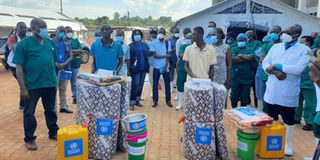Prime
Two Ebola survivors discharged from hospital

Two Ebola survivors pose with health workers after they were discharged from Mubende Regional Referral Hospital on September 30, 2022. PHOTO/ COURTESY
Health teams at the isolation facility in Mubende Regional Referral Hospital at the weekend discharged two people who had been infected with Ebola.
“The two people should be our ambassadors at their respective areas of residence so that Ebola can be cured. We are grateful to the health teams,” Dr Jane Ruth Aceng, the Health minister, said during their release.
She was in the company of the World Health Organisation (WHO) country representative, Dr Yonas Tegegn Woldemariam, and health partners.
Dr Paskar Apiyo, a consultant physician attached to Gulu Hospital but currently heading the Mubende team, said the duo had undergone intensive treatment after their sample tests turned out positive.
“We are happy that after the treatment, the two had their respective samples tested and proved negative. For the last three days, they have shown no signs and symptoms and are able to walk and do normal work,” Dr Apiyo said.
Mr Alex Ssebayiga, one of those who recovered, said it was God’s grace and the hard work of the health teams that ensured he beat the disease .
“I lost my child and did not know what was behind the illness until the medical teams evacuated me to hospital. I had lost hope. I have two of my children still admitted to the isolation wing but I pray that they also recover,” he said.
Mr Ssebayiga is a resident of Kisamula Village, Madudu Sub-county, the epicentre of the EVD in Mubende District.
Dr Aceng advised the duo to act cautiously and avoid engaging in sex for at least one year.
“The medical teams advise that you abstain from sex for 90 days but I would advise that you take a year for your own good. This for your own safety and of your family members,” she said.
Health experts have asked the government to bolster access to Ebola testing, reduce turnaround time for the results.
“The government must provide information, do quick and accurate tests, and inform people quickly. When tests are not done in time and information is delayed, the disease spreads,” Prof Khama Rogo, the former head of the World Bank Group’s Health in Africa Initiative, said last week.





